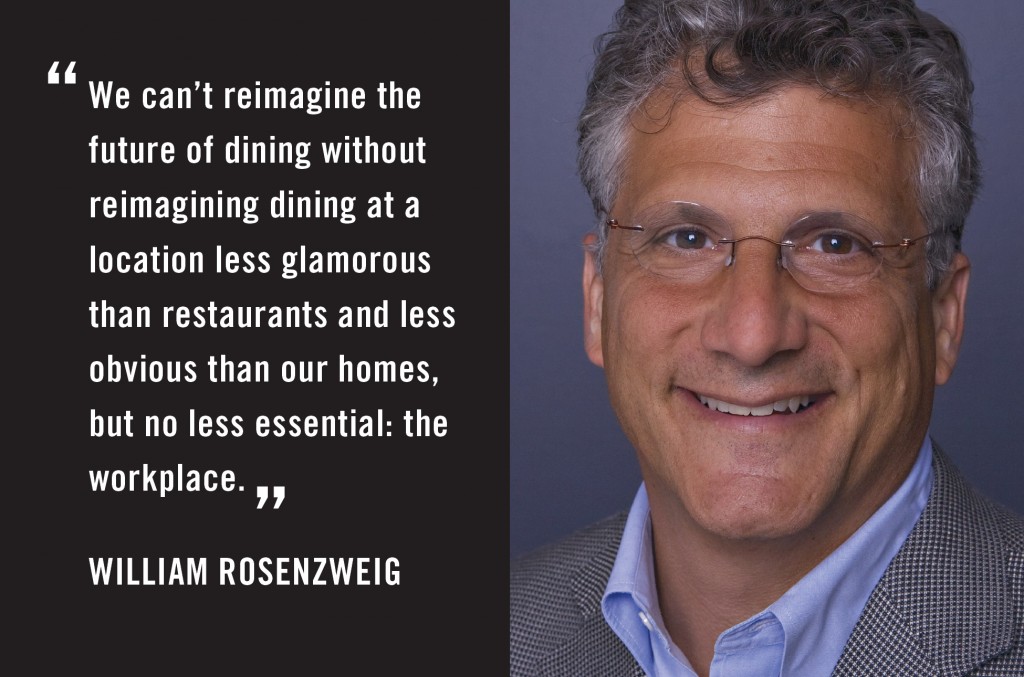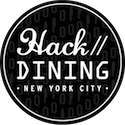Guest post by William Rosenzweig, Managing Partner of Physic Ventures & Chairman, Vitality Commission. The views expressed here are solely those of the author and do not reflect the views of Food+Tech Connect.
We can’t reimagine the future of dining without reimagining dining at a location less glamorous than restaurants, and less obvious than our homes, but no less essential: the workplace.
Compared with the 1970s, Americans work 200 additional hours per year. One of many implications of working more is eating more meals at work—at the very least, about one in four meals as a fulltime employee. Unfortunately, foods eaten away from home tend to be less healthy than foods prepared at home, which is an important factor in the nation’s unsustainable obesity epidemic. Given cultural shifts in eating habits—and despite many challenges—the workplace offers a fruitful opportunity to promote health.
Workplace food provision varies dramatically: from free, gourmet cuisine at large high-tech corporations, to small firms where the only food on site comes from employees—say, a cake for a colleague’s birthday, Lean Cuisine for lunch, or a TGIF donut box in the break room. Among businesses that do provide food, very few integrate it into a larger program supporting employee well-being. In addition, fundamental tensions exist. For instance, employers want to create fun work cultures to recruit and retain talent, yet also nurture healthy daily eating habits through environments that make those habits as easy as possible for employees.
Employers who do invest in workforce health see a positive return on investment: For every dollar a company spends on workforce health programs, it saves $3.27 in medical costs. Healthy eating on the job is also associated with higher job performance. Yet, we still lack much of the data that could demonstrate the various benefits of investing in healthy eating programs.
Here are some ideas for using information and technology to transform food at work into an effective avenue for health promotion:
- Develop common metrics: Currently, there is a dearth of data. To get more companies on board with providing healthy food to employees, we must collect, analyze, and share data demonstrating the competitive advantage of investing in a healthy workforce. Strategic outcomes may include lower healthcare costs, higher productivity, long-term company growth, and talent recruitment and retention.
- Harness the power of storytelling: Create a digital platform to share best practices and success stories across companies.
- Develop order-ahead systems for workplace cafeterias: Shift the decision-making time for lunch from the hungriest moment of entering the dining area (aka, the moment of highest susceptibility to that aroma of fries wafting overhead) to ordering in advance. This can help eaters be more intentional about their daily selections.
- Publish company-wide reports on workforce health, including food provision and consumption patterns: These can help cultivate a corporate culture that prioritizes healthy eating on the job. Business schools, for instance, could rank companies on common criteria.
For further ideas and background on these challenges and opportunities, please read my piece in Huffington Post, entitled “Food at Work: Setting the Table for a Healthy Workforce.” To get involved in reimagining workplace dining, please contact vitalityinstitute@thevitalitygroup.com.
Hacking Dining is online conversation exploring how we might use technology and design to hack a better future for dining. Join the conversation between June 2-30, and share your ideas in the comments, on Twitter using #hackdining, Facebook, LinkedIn or Tumblr.
________________
 William B. Rosenzweig has spent more than twenty years integrating the practices and perspectives of an entrepreneur, venture investor and educator. Will is Managing Partner at Physic Ventures, LP, the first venture capital firm dedicated to investing in keeping people healthy by providing capital and expertise to science and technology-based, health and sustainability companies. Based in San Francisco, the firm’s strategy is to capitalize on major economic, social and political trends shaping the landscape of consumer health, well-being, and sustainable living. Read his full bio here.
William B. Rosenzweig has spent more than twenty years integrating the practices and perspectives of an entrepreneur, venture investor and educator. Will is Managing Partner at Physic Ventures, LP, the first venture capital firm dedicated to investing in keeping people healthy by providing capital and expertise to science and technology-based, health and sustainability companies. Based in San Francisco, the firm’s strategy is to capitalize on major economic, social and political trends shaping the landscape of consumer health, well-being, and sustainable living. Read his full bio here.




